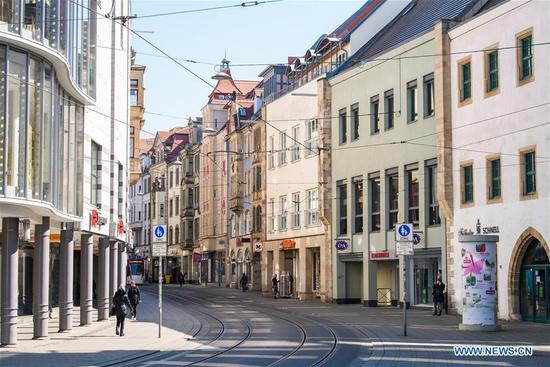Germany cancels Easter festivities as COVID-19 cases rise

Few pedestrians are seen in a shopping street in Erfurt, central Germany, on April 1, 2020. (Photo by Kevin Voigt/Xinhua)
By Nadeem Gill
Germany canceled Easter celebrations amid growing cases of COVID-19 as Chancellor Angela Merkel said a pandemic doesn't take a vacation.
She announced the extension of restrictions on public life to control the spread of coronavirus by two weeks until April 19, saying in a telephone conference following a video meeting with 16 regional state premiers that the decision was made after the situation was assessed on Wednesday.
German authorities initially ordered restaurants shut and banned gatherings of more than two people for two weeks on March 22.
Merkel previously ruled out lifting the restrictions too early, saying such a move would be far worse.
"It would be much worse to do it too early, and we are still very far away from what we need to achieve," she added.
German media quoted a transcript of her call which asked the public to follow the guidelines by limiting contact with people except for the members of their household even during Easter holidays to a necessary minimum.
Residents have been urged not to travel over the Easter holidays.
A board with coronavirus information is seen at the Neumarkt subway station, as the spread of COVID-19 continues in Cologne, Germany, March 30, 2020. /Reuters
It means that this year's religious festival will be different for Germany's population of 82 million, with no Easter fire, rabbits and family gatherings.
Easter has to be different this year, Merkel said.
Germany will again review the restrictions on April 14, the chancellor said, after Easter, which will be marked on April 12.
She said reassessment of the measures would be based on the advice from the Robert Koch Institute for public health (RKI), which is leading the country's fight against the virus.
Reiner Haseloff, the premier of Germany's state of Saxony-Anhalt, ruled out the probability that life in the country will return to normal after Easter.
"We are still in the middle of the rising phase, and that is why we really have to stand together now," Germany's mass circulated newspaper Bild quoted him as saying.
German President Frank Walter-Steinmeier said in a video message on Thursday that the ''crisis awakens our deepest fears''.
"But it also brings out the best in us. It is this, dear fellow citizens, that we must now hold to."
The message was posted on social media which praised the willingness of people to help each other during challenging times.
The number of infections is still growing sharply in the country with more than 75,000 cases reported and over 900 deaths.
Germany's largest state Bavaria is now the crisis hot spot, where more than 18,000 cases have been reported. In the most populous state of North Rhine-Westphalia, more than 17,000 people have been infected.
Bavaria is marking the highest nationwide growth as the number of confirmed cases doubles every five days.
Germany, however, has increased the number of intensive care beds in its clinics from 28,000 to about 40,000.
Gerald Gass, the head of the German Hospital Society, was quoted in the daily Rheinische Post as saying that roughly 15,000 to 20,000 remain free.
